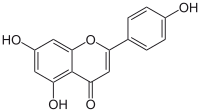
Photo from wikipedia
The aim of this study was to synthesize chalcone-polyamine conjugates in order to enhance bioavailability and selectivity of chalcone core towards cancer cells, using polyamine-based vectors. Indeed, it is well-known… Click to show full abstract
The aim of this study was to synthesize chalcone-polyamine conjugates in order to enhance bioavailability and selectivity of chalcone core towards cancer cells, using polyamine-based vectors. Indeed, it is well-known that polyamine transport system is upregulated in tumor cells. 3',4,4',5'-tetramethoxychalcone was selected as parent chalcone since it was found to be an efficient anti-proliferative agent on various cancer cells. A series of five chalcone-polyamine conjugates was obtained using the 4-bromopropyloxy-3',4',5'-trimethoxychalcone as a key intermediate. Chalcone core and polyamine tails were fused through an amine bond. These conjugates were found to possess a marked in vitro antiproliferative effect against colorectal (HT-29 and HCT-116) and prostate cancer (PC-3 and DU-145) cell lines. The most active conjugate (compound 8b) was then chosen for further biological evaluations to elucidate mechanisms responsible for its antiproliferative activity. Investigations on cell cycle distribution revealed that this conjugate can prevent the proliferation of human colorectal and prostate cancer cells by blocking the cell cycle at the G1 and G2 phase, respectively. Flow cytometry analysis revealed a sub-G1 peak, characteristic of apoptotic cell population and our inquiries highlighted apoptosis induction at early and later stages through several pro-apoptotic markers. Therefore, this chalcone-N1-spermidine conjugate could be considered as a promising agent for colon and prostatic cancer adjuvant therapy.
Journal Title: European journal of medicinal chemistry
Year Published: 2021
Link to full text (if available)
Share on Social Media: Sign Up to like & get
recommendations!